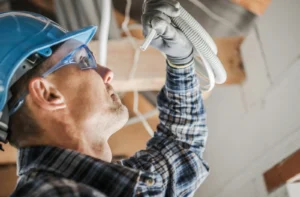Enhancing performance and safety in electrical systems is crucial for dealers. Mastery of proper wiring techniques and circuitry principles is essential. Adhering to safety protocols is vital to reducing risks and ensuring dependable services. Regular maintenance enhances longevity, prevents downtime, and cuts costs. Promptly addressing faulty wiring, overloaded circuits, and flickering lights is imperative.
Key tips include regular inspection, early problem detection, and correct servicing. Utilizing cutting-edge diagnostic tools, scheduling routine inspections, and implementing efficient strategies elevate reliability. Enhance your expertise with this guide to electrical maintenance for dealers and excel in electrical maintenance.
Key Takeaways
- Proper wiring techniques are essential for dealer safety and system reliability.
- Regular maintenance ensures peak performance, reduces downtime, and minimizes repair costs.
- Addressing common issues like faulty wiring and overloaded circuits is crucial for efficient operations.
- Preventative maintenance includes inspections, early issue identification, and equipment servicing to prevent failures.
- Utilizing advanced diagnostic tools and efficient maintenance strategies improves equipment reliability and market competitiveness.
Understanding Electrical Maintenance Basics
Within electrical maintenance, understanding the fundamentals acts as the cornerstone for guaranteeing the durability and effectiveness of electrical systems. Grasping the basics such as proper wiring techniques, circuitry principles, and safety protocols assures peak performance and minimizes the risk of malfunctions. This knowledge empowers dealers to provide reliable services, improve customer satisfaction, and maintain a competitive edge in the market.
Importance of Regular Maintenance
Regular maintenance plays a vital role in ensuring the longevity and peak performance of electrical systems for dealers. By conducting routine checks and servicing, dealers can prevent unexpected downtime, reduce repair costs, and maintain a safe working environment. Regular maintenance additionally helps in identifying potential issues early on, allowing for timely interventions and ensuring continuous operation of the electrical systems.
Common Electrical Issues for Dealers
Ensuring the longevity and peak performance of electrical systems for dealers through regular maintenance involves addressing common electrical issues that can impact operations and safety. Some common issues dealers may face include faulty wiring, overloaded circuits, tripping breakers, and flickering lights. Identifying and quickly resolving these issues is vital to maintaining a safe and efficient electrical system in a dealership setting.
Tips for Preventative Maintenance
Implementing a proactive approach to maintenance is important for dealers looking to uphold the reliability and functionality of their electrical systems. Regularly inspecting and testing electrical components, such as wires, connections, and fixtures, can help identify potential issues before they escalate. Cleaning and servicing equipment, like switches and circuit breakers, further aids in preventing unexpected failures, ensuring a smooth operation for dealers.
Implementing Effective Maintenance Strategies
Utilizing advanced diagnostic tools and scheduling routine inspections are key components of establishing efficient maintenance strategies for dealers in the electrical industry. By leveraging technology for predictive maintenance, dealers can identify potential issues before they escalate, reducing downtime and costly repairs. Implementing a proactive approach to maintenance not only improves equipment reliability but also guarantees peak performance, providing a competitive edge in the market.

Frequently Asked Questions
What Are the Most Common Mistakes Dealers Make When It Comes to Electrical Maintenance?
When it comes to electrical maintenance, vendors commonly make mistakes like neglecting routine inspections, using inappropriate equipment, and overlooking safety protocols. These errors can lead to hazardous situations, increased costs, and potential legal liabilities.
How Can Dealers Ensure Their Electrical Systems Are up to Code?
To guarantee electrical systems are up to code, dealers must conduct regular inspections, adhere to local regulations, and employ licensed electricians for installations and repairs. Compliance with standards and safety protocols is crucial to maintain operational efficiency and prevent hazards.
Are There Any Specific Tools or Equipment Dealers Should Have for Electrical Maintenance?
For electrical maintenance, dealers should have necessary tools like multimeters, circuit testers, wire strippers, and insulated tools. Equipment like voltage detectors and power drills are additionally beneficial. Proper training on these tools is important for safety and efficiency.
What Are Some Signs That Indicate a Dealer’s Electrical System May Need Immediate Attention?
Indicators showing a dealer’s electrical system needs urgent attention include blinking lights, triggered circuits, burning odors, and warm outlets. Prompt evaluation by a certified electrician is vital to prevent safety hazards and guarantee uninterrupted operations.
How Can Dealers Stay Updated on the Latest Electrical Maintenance Trends and Technologies?
To stay updated on the latest electrical maintenance trends and technologies, dealers should engage in continuous professional development through industry conferences, webinars, and training programs. Subscribing to reputable trade publications and networking with industry experts can additionally provide valuable insights.
Conclusion
In summary, adherence to thorough electrical maintenance practices is vital for dealers to guarantee peak functionality, safety, and compliance with industry standards. By following the guidelines outlined in this guide, dealers can effectively address common electrical issues, implement preventative maintenance measures, and improve the longevity and performance of their electrical infrastructure. This strategic approach will ultimately lead to cost savings and heightened customer satisfaction within dealer operations.
You May Also Like:
